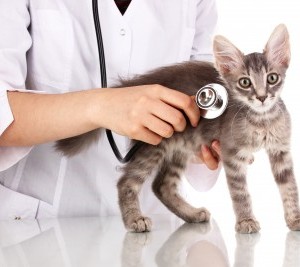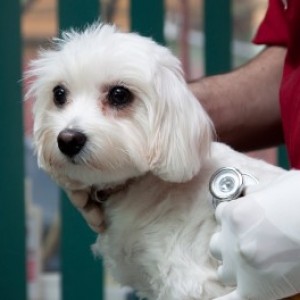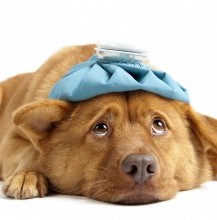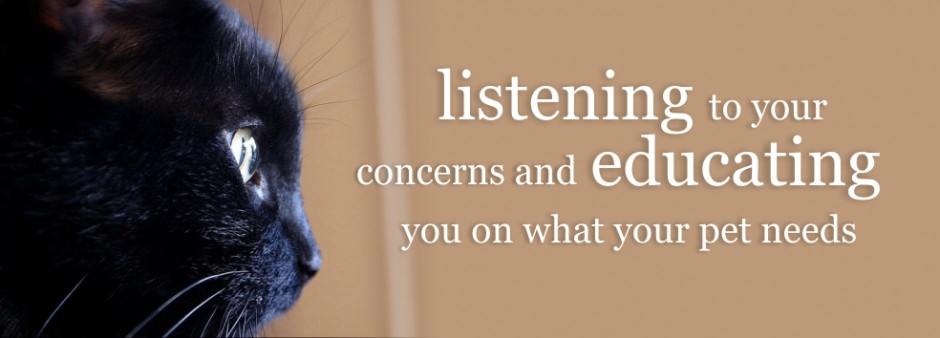Why Are Vaccines Important For My Pet?
December 21, 2012
Why Vaccinate? | Types of Vaccines | Reactions | Vaccine Associated Cancer | Pregnant or Lactating Pets | Vaccination Summary
by Dr. Abigail Messina, DVM
VACCINATING PUPPIES AND KITTENS
The goal of vaccinating pets is to stimulate protective immunity to a specific disease. That way, if the pet is ever exposed to that disease, the odds of them getting sick are nearly zero. By vaccinating, we expose the pet to an “antigen” that is very similar to a disease but that cannot actually cause disease. An antigen is a substance that causes the body to produce antibodies, which protects you if you encounter that disease in the future. Therefore, the antigen of a vaccine tricks our pet’s immune systems into building immunity against actual disease. Sometimes the vaccine induced protective immunity lasts for years without needing a repeat (booster) vaccination; however, some diseases need yearly revaccination to keep immunity at a protective level.
 It is recommended that puppies and kittens begin their vaccinations at about 6 weeks of age. The vaccine inoculation often includes several different disease antigens combined into one injection dose. In young animals we can’t be sure that a single inoculation will stimulate a protective level of immunity, so monthly follow-up vaccinations (boosters) are recommended until the pet is about 16 weeks old. It has been shown that healthy pets will have a good, protective immune response to the administered vaccine when given at this age.
It is recommended that puppies and kittens begin their vaccinations at about 6 weeks of age. The vaccine inoculation often includes several different disease antigens combined into one injection dose. In young animals we can’t be sure that a single inoculation will stimulate a protective level of immunity, so monthly follow-up vaccinations (boosters) are recommended until the pet is about 16 weeks old. It has been shown that healthy pets will have a good, protective immune response to the administered vaccine when given at this age.
Pet owners often ask an excellent question: “Why not wait until they’re 4 months of age and then just give them one inoculation rather than starting a series of inoculations at 6 weeks of age?”
The answer is that when puppies or kittens are born, they have no immunity toward disease, leaving them highly susceptible. By nursing, they are able to obtain antibodies through their mother’s milk, which protects them until their immune systems mature and they are able to produce antibodies for themselves. How long these maternal antibodies last in a given pet varies with each individual; and different antibodies towards different diseases each wear off at different times. So in the time before your pet has a competent immune system, protective antibodies from mom are wearing off, leaving them susceptible to disease. This is why we vaccinate before 4 months, so they are protected during that time. We give our last vaccine at or after 4 months because we know that by that time, the pet’s immune system is able to function adequately on it own.
[Back To Top]
VACCINES AVAILABLE
 There are many different vaccines available. Certain vaccines are called “core” vaccines; meaning we recommend this vaccination to every pet. Other vaccines are “non-core” or “optional” vaccines; meaning they are given when indicated by your pets risk of exposure. Core vaccines include canine and feline distemper, and rabies. The distemper vaccines are combination vaccines, meaning they protect against multiple different diseases combined into a single shot. Optional vaccines are lyme, feline leukemia, and kennel cough. Whether or not a particular pet gets vaccinated against a specific disease depends greatly on their exposure to that disease, age, and overall health status. For example, a dog who lives mostly indoors may not need the Lyme disease vaccine, but a hunting dog who is at higher risk should be vaccinated; or, an indoor only cat may not necessarily need to be vaccinated against feline leukemia, however a cat that goes outside should be protected against that disease.
There are many different vaccines available. Certain vaccines are called “core” vaccines; meaning we recommend this vaccination to every pet. Other vaccines are “non-core” or “optional” vaccines; meaning they are given when indicated by your pets risk of exposure. Core vaccines include canine and feline distemper, and rabies. The distemper vaccines are combination vaccines, meaning they protect against multiple different diseases combined into a single shot. Optional vaccines are lyme, feline leukemia, and kennel cough. Whether or not a particular pet gets vaccinated against a specific disease depends greatly on their exposure to that disease, age, and overall health status. For example, a dog who lives mostly indoors may not need the Lyme disease vaccine, but a hunting dog who is at higher risk should be vaccinated; or, an indoor only cat may not necessarily need to be vaccinated against feline leukemia, however a cat that goes outside should be protected against that disease.
[Back To Top]
REACTIONS
Any individual animal has the potential to experience an adverse response to any vaccine. These vaccine reactions are almost always unpredictable, just like an adverse reaction in humans to peanuts, seafood, penicillin, or bee stings. The most common reactions seen are relatively mild, and include vomiting, swelling of the face or paws, diarrhea, or muscle discomfort; rarely, however, reactions can be more severe and can include autoimmune disease or collapse. If your pet has an adverse reaction to a particular vaccine, you and your veterinarian will work together to develop a personalized vaccination plan that best fits your pet’s needs.
[Back To Top]
VACCINE ASSOCIATED CANCER
Recently, there has been much discussion among veterinarians and pet owners alike regarding the possibility of vaccines being involved in a rare form of cancer in cats. The incidence of this cancer is very low, occurring in approximately 1 out of 100,000 cats. There are still many questions revolving around this cancer, called fibrosarcoma, and research is still being done to better understand how vaccines and other injections may be involved. The current theory is that certain vaccines called “killed vaccines” may pose the biggest risk, along with various other factors including genetics. Killed vaccines are relatively inadequate on stimulating an appropriate immune response on their own, and in order to be effective, need to have a substance called an adjuvant added. The adjuvant can lead to local inflammation, which has the possibility of causing pre-cancerous changes to the cells in that area. There have been many changes in vaccines to avoid using adjuvants in order to lower the risk of this problem in our cats. Please ask for more information at your next annual visit, and we would be happy to discuss this topic in more detail.
[Back To Top]
PREGNANT OR LACTATING ANIMALS
Certain vaccines cannot be administered safely to a pregnant or nursing pet. Please inform your veterinarian if you think your pet may be pregnant, or is nursing when she is going to be vaccinated.
[Back To Top]
SUMMARY
 Together we will create a vaccine protocol individually tailored for each pet that considers the pros and cons of a given vaccine along with your pet’s risk against that particular disease. The goal is to safeguard against disease and optimize a long and healthy life for your pet.
Together we will create a vaccine protocol individually tailored for each pet that considers the pros and cons of a given vaccine along with your pet’s risk against that particular disease. The goal is to safeguard against disease and optimize a long and healthy life for your pet.
If you have any further questions about this topic, or any concerns about your pet, please don’t hesitate to call us at Chase Farm Veterinary Hospital (508) 995-9935.
Not a client here? That’s ok! We are always happy to add new members to our Chase Farm family. Please call if you are interested in scheduling an appointment, and we would be happy to accommodate you and your pets’ needs as best we can. If you would like a complimentary hospital tour before, or at the time of your appointment, one of our friendly receptionists are always happy to show you around. Click Here to get in touch with us!
Posted in General, Importance of Vaccines, Vaccine Reactions, Vaccines

I am a vet tech at Chase Farm. Dr. Messina, this is a great blog filled with all the important information. I have been in appointments where owners ask questions about vaccines. You answered their questions in this blog and explained it in non-doctor language. Great job, and thank you for taking the time to write this. I know our clients will get a lot of it.